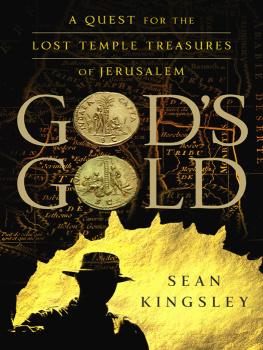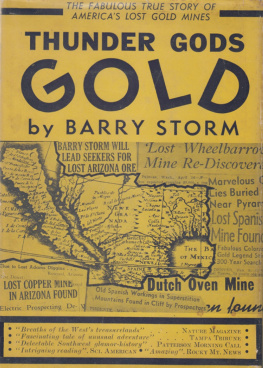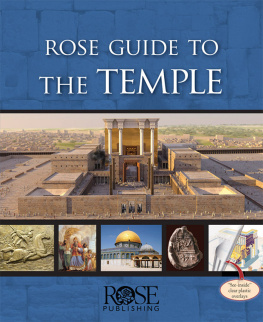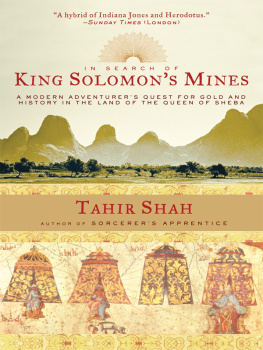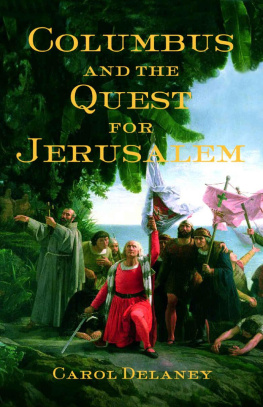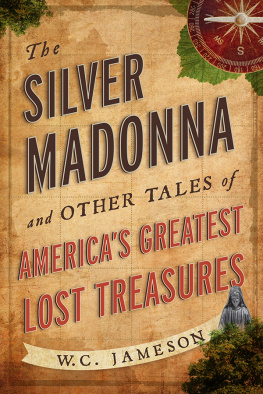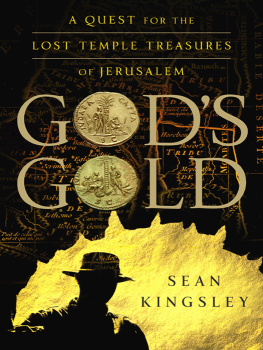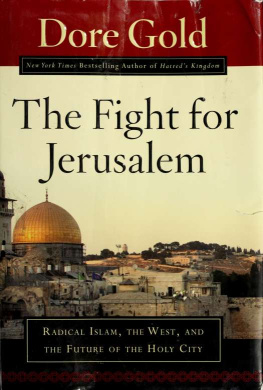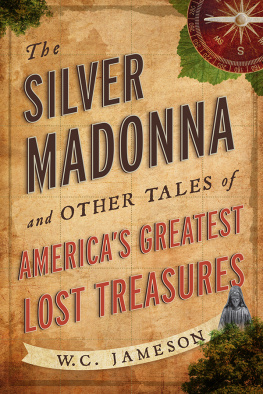Sean Kingsley - Gods Gold: A Quest for the Lost Temple Treasures of Jerusalem
Here you can read online Sean Kingsley - Gods Gold: A Quest for the Lost Temple Treasures of Jerusalem full text of the book (entire story) in english for free. Download pdf and epub, get meaning, cover and reviews about this ebook. year: 2008, publisher: HarperCollins, genre: Science fiction. Description of the work, (preface) as well as reviews are available. Best literature library LitArk.com created for fans of good reading and offers a wide selection of genres:
Romance novel
Science fiction
Adventure
Detective
Science
History
Home and family
Prose
Art
Politics
Computer
Non-fiction
Religion
Business
Children
Humor
Choose a favorite category and find really read worthwhile books. Enjoy immersion in the world of imagination, feel the emotions of the characters or learn something new for yourself, make an fascinating discovery.
- Book:Gods Gold: A Quest for the Lost Temple Treasures of Jerusalem
- Author:
- Publisher:HarperCollins
- Genre:
- Year:2008
- Rating:5 / 5
- Favourites:Add to favourites
- Your mark:
- 100
- 1
- 2
- 3
- 4
- 5
Gods Gold: A Quest for the Lost Temple Treasures of Jerusalem: summary, description and annotation
We offer to read an annotation, description, summary or preface (depends on what the author of the book "Gods Gold: A Quest for the Lost Temple Treasures of Jerusalem" wrote himself). If you haven't found the necessary information about the book — write in the comments, we will try to find it.
Sean Kingsley: author's other books
Who wrote Gods Gold: A Quest for the Lost Temple Treasures of Jerusalem? Find out the surname, the name of the author of the book and a list of all author's works by series.
Gods Gold: A Quest for the Lost Temple Treasures of Jerusalem — read online for free the complete book (whole text) full work
Below is the text of the book, divided by pages. System saving the place of the last page read, allows you to conveniently read the book "Gods Gold: A Quest for the Lost Temple Treasures of Jerusalem" online for free, without having to search again every time where you left off. Put a bookmark, and you can go to the page where you finished reading at any time.
Font size:
Interval:
Bookmark:
TO MY FAMILY PAST AND PRESENT,
lost in the concentration camps of Nazi Europe,
reborn on the streets of London.
On the summit of the Sacred Way in the Forum of Rome, an infamous monument conceals brutal memories and an eternal secret. Passage through the Arch of Titus is today blocked by request of the government of Israel and by order of the Italian prime minister to heal an ancient wrong. Rome built the arch to commemorate its destruction of Israel in AD 70, which witnessed the death of over 600,000 Jews during the First Jewish Revolt of AD 6670. The last dignitaries said to have formally walked through were Benito Mussolini and Adolf Hitler. Today tour guides give visiting Jews permission to spit on the archs walls and so condemn what it stands for.
A relief on the southern wall of the arch immortalizes one of the most pivotal moments in history. Fifteen men can be seen parading through the streets of Rome in a triumph celebrated in AD 71 by the emperor Vespasian and his son, Titus, who, a year before, had crushed Israel and the First Jewish Revolt. On their shoulders Roman soldiers carry the broken dreams of the Jewish nation, the gold menorah (candelabrum), a pair of silver trumpets, and the gold and gem-studded Table of the Divine Presence ransacked from the Temple in Jerusalemintimate instruments of communication between God and man.
While the Arch of Titus is a popular monument today, the fate of the Temple treasure of Jerusalem has slipped through the cracks of modern exploration. Western consciousness hungers for ancient treasure. Hundreds of books, TV documentaries, and Hollywood movies have trawled lands and seas for the Ark of the Covenant, the Holy Grail, Noahs Ark, and Atlantis.
Yet the Temple treasure remains the most valuable and attainable of all these iconic objects and themes. Most of these alluring subjects are fascinating but, in reality, no more than the stuff of myth and legend. The Holy Grail was an invention of medieval literature. And the Ark of the Covenant was regrettably destroyed in 586 BC, when King Nebuchadnezzar of Babylon torched the First Temple of Jerusalem. So it no longer exists to be discovered. This leaves the candelabrum, Table of the Divine Presence, and trumpets of truth immortalized on the Arch of Titus as the greatest treasure to have survived Bible times.
But so far they have remained beyond the grasp of man. Various characters have pursued the Temple treasure. From 1909 to 1911, in Jerusalem the philosopher Valter Juvelius and Captain Montague Parker dug around the Temple walls and even illegally within the Dome of the Rock mosque in search of an anticipated $200 million windfall. The 4 trillion francs that the parish priest Brenger Saunire was inaccurately credited with having discovered in rural Rennes-le-Chteau in southern France around 1885 was said to have been Temple treasure hidden by a Merovingian king. And after translating the Copper Scroll found in Cave 3 near Qumran in Israel, Dr. John Allegro led a failed expedition to the Dead Sea from 1960 to 1963 in search of Gods gold. All of these theories proved hollow. The revelation of the Temple treasures true hiding place today, and the story of how it ended up there, is my quest.
If the real Temple treasure has remained elusive until now, Hollywood has recently glossed over fact. In 2004, Nicolas Cage played a guardian of Jerusalems vanished secrets, Ben Gates, in National Treasure. This action-packed adventure crossed the globe in search of King Solomons gold, and using crypts, codes, and maps at the end exposed a $10 billion treasure deep beneath Trinity Church on the corner of Wall Street and Broadway in New York. All extremely exciting and entertaining, but only make-believe: youd be hard pushed to explain how the statues of Egyptian pharaohs, mummy coffins, and papyrus scrolls from the great library at Alexandria uncovered by Ben Gates ended up in a Jewish temple.
When most people think of treasure, their eyes light up and they are overcome by what Freud called the dreamlike oceanic feeling. Certainly the three central objects depicted on the Arch of Titus are priceless artistic masterpieces worth billions at auction. Money, however, is not what makes the Temple treasure so intriguing to me. Im happy to borrow the closing lines of Ben Gates in National Treasure, who promises to donate his discoveries to the Smithsonian, the Louvre, and Cairo Museum because theres thousands of years of world history down there and it belongs to the world and everyone in it. For me archaeology has always been about knowledge rather than possession.
Gods Gold, the first physical quest for the Temple treasures of Jerusalem immortalized on the Arch of Titus, brings the history of these awesome icons back to the world. So little is known about their antiquity, artistry, symbolism, and, most crucially, their fate down the centuries. Did the Romans melt them down to swell the imperial coffers? Did the swirling winds of changebarbarians, Vandals, Byzantines, Persians, and Islamdestroy them? Or could they have survived into the modern era? To address these questions I have circled the Mediterranean twice since 1991 and time-traveled across six hundred years of history.
Along the way I confronted a host of ancient ghosts from famous emperors and politicians to theologians and general troublemakers. Although the quest incorporates rich texts and archaeological remains, the testimonies of two brilliant minds have contributed enormously to the cause. The first is Flavius Josephus, a Jewish priest of royal descent born in Jerusalem in AD 37. Josephus started the First Jewish Revolt as commander of the Jewish forces in the Galilee, but ended it as military adviser to the Roman emperor. For swapping sides and turning imperial informer, he remains vilified in many religious and political circles. Yet he was a realist who knew the game was up for his fellow revolutionaries. The iron fist of Rome could not be resisted.
After Vespasians victory, Josephus set about memorializing the complete history of biblical Israel in Antiquities of the Jews and the Jewish War. Both are rich mines of knowledge tapping incredible storiesfascinating and harrowingabout the social, military, and religious history of Palestine from the days of the Exodus from Egypt into the AD 70s.
My second major source spun his literary magic centuries later. Born in the late fifth century AD, Procopius of Caesarea in Palestine lived until around AD 562. His was a world of profound change, and he witnessed firsthand the end of classical antiquity and rise of the Byzantine orientalist era. As the court historian of the emperor Justinian (AD 527565), in his History of the Wars Procopius wrote lively accounts of the empires battles with Goths, Vandals, and Persians, and in Buildings he chronicled Justinians colossal building program across the Mediterranean. Despite his formal position at court, however, in private the historian detested the emperors immoral behavior and anarchic style of rule, and in the dark hours he penned a clandestine, venomous book. The Secret History lifted the lid on myriad scandals in embarrassing detail and, miraculously, still exists.
We dont know what Josephus or Procopius looked like. No portraits survive, only their words. Both historians are far less well known than the fifth-century BC word spinners Herodotus and Thucydides, but deserve equal billing as preeminent historical voices. I hope the reader will appreciate their fine attention to fact, yet their love of a good yarn as well.
Gods Gold is a quest for truth. I have no political or religious ax to grind, no preconceived ideology to push. I write this as an objective archaeologist, historian, and humanist, not as a theologian. The reader will not encounter fanciful crypts and codes; more often than not the truth is more staggering than any fiction. Even the dramatized account of the destruction of Jerusalem in AD 70, described in chapter 1, River of Gold, derives from factual detail in Flavius Josephuss Jewish War. (The only artistic license surrounds the export of the Temple treasures from the port of Caesarea.) This is no fairyland. All of the crazy, harrowing, and tragicomic events described in this book actually happened.
Font size:
Interval:
Bookmark:
Similar books «Gods Gold: A Quest for the Lost Temple Treasures of Jerusalem»
Look at similar books to Gods Gold: A Quest for the Lost Temple Treasures of Jerusalem. We have selected literature similar in name and meaning in the hope of providing readers with more options to find new, interesting, not yet read works.
Discussion, reviews of the book Gods Gold: A Quest for the Lost Temple Treasures of Jerusalem and just readers' own opinions. Leave your comments, write what you think about the work, its meaning or the main characters. Specify what exactly you liked and what you didn't like, and why you think so.

